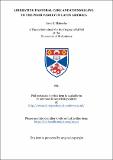Liberating pastoral care and counselling to the poor family in Latin America
Abstract
This thesis adapted the methodology of Liberation Theology described by Leonardo and Clodovis Boff in three stages: "seeing", "judging", and "acting". The first chapter -"seeing"- studies what social sciences say about the actual situation of the poor family in Latin America. There is not 'one model' of Latin American family, but poverty is not much different in one part or another of the continent. Poor families are those who, according to Gustavo Gutierrez, form something collective, those who have an historical awareness of their situation, and those who join with others in order to struggle against the unjust situation which maintains them in poverty. The second chapter -"judging"- studies what theologians and psychotherapists say about poverty. There were chosen two viewpoints, Liberation Theology and the Eco-structural Approach to Family Therapy. Nevertheless, this was not an arbitrary decision. Liberation Theology was chosen because it opts a preference for the poor and denounces that poverty is caused by sin, oppression and injustice that are against the will of God. Eco-structural approach was chosen because it assesses the situation of the poor in their own context, it proposes a pertinent therapy for the poor, and its ecological perspective can be applied to the poor family in Latin America. The third chapter -"acting" presents a proposal of a model of counselling which is committed to the cause of the poor. It is ecological and recommends a counselling that work 'with' rather than 'for' the poor, it means, the poor must no longer be considered as objects but subjects of their own struggle. The counselling cannot be imposed from 'outside' the poor but from 'inside' themselves.
Type
Thesis, MPhil Master of Philosophy
Collections
Items in the St Andrews Research Repository are protected by copyright, with all rights reserved, unless otherwise indicated.

